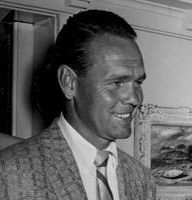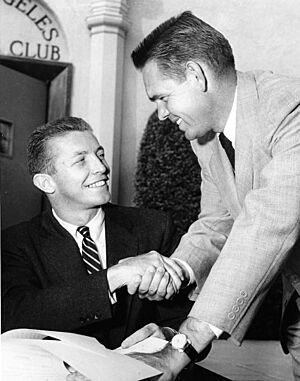Jack Kramer facts for kids

Kramer in the late 1940s
|
|
| Full name | John Albert Kramer |
|---|---|
| Country (sports) | |
| Born | August 1, 1921 Las Vegas, Nevada, U.S. |
| Died | September 12, 2009 (aged 88) Bel Air, California, U.S. |
| Height | 6 ft 2 in (1.88 m) |
| Turned pro | November 1947 (first senior amateur event 1937) |
| Retired | 1954 |
| Plays | Right-handed (one-handed backhand) |
| College | Rollins College |
| Int. Tennis HoF | 1968 (member page) |
| Singles | |
| Career record | 707–305 (69.8%) |
| Career titles | 35 |
| Highest ranking | No. 1 (1946, Pierre Gillou, Harry Hopman) |
| Grand Slam singles results | |
| Wimbledon | W (1947) |
| US Open | W (1946, 1947) |
| Professional majors | |
| US Pro | W (1948) |
| Wembley Pro | W (1949) |
| French Pro | F (1950) |
| Doubles | |
| Grand Slam doubles results | |
| Wimbledon | W (1946, 1947) |
| US Open | W (1940, 1941, 1943, 1947) |
| Grand Slam mixed doubles results | |
| US Open | W (1941) |
| Team competitions | |
| Davis Cup | W (1946, 1947) |
John Albert Kramer (born August 1, 1921 – died September 12, 2009) was an American tennis star from the 1940s and 1950s. He won three major tournaments called Grand Slams. These included the U.S. Championships in 1946 and 1947, and Wimbledon in 1947.
Jack Kramer also helped the U.S. Davis Cup tennis team win in 1946 and 1947. After becoming a professional player, he won the U.S. Pro Championship in 1948 and the Wembley Pro Championships in 1949. Many people consider him one of the best tennis players of his time. He was also very important in shaping modern professional tennis.
Contents
Jack Kramer's Tennis Career
Playing as an Amateur
Jack Kramer started playing tennis by taking lessons from a famous coach named Dick Skeen. He quickly became good enough to play in junior tournaments. He practiced a lot at the Los Angeles Tennis Club (LATC). There, he got to play against top players like Ellsworth Vines and Bill Tilden.
Kramer won the National Boys' Championship in 1936. He also won the National Juniors Interscholastics in 1938. He played in the U.S. National Championships several times. In 1943, he reached the final but lost.
After World War II, Kramer won his first major singles title. This was at the U.S. Championships in 1946. He won easily, losing only one set in the whole tournament. Many experts ranked him as the world's number one amateur player that year.
In 1947, Kramer won the Wimbledon title. He beat Tom Brown in a very fast final. Later that year, he won the U.S. Championships again. He had to fight hard, coming back from two sets down to win. He was again ranked as the world's number one amateur player.
Kramer also played for the U.S. Davis Cup team. He helped the team win against Australia in both 1946 and 1947. He won all four of his singles matches in those finals.
Becoming a Professional Player
In November 1947, Jack Kramer became a professional tennis player. He signed a big contract for $50,000 a year. This was the largest amount ever offered to a tennis player at that time.
Kramer vs. Riggs Tour (1948)
Kramer played his first professional match on December 26, 1947. He played against Bobby Riggs at Madison Square Garden. Riggs won that first match. However, Kramer soon started winning more often. He changed his playing style to rush the net more. Kramer ended up winning their tour 69 matches to 20.
In June 1948, Kramer beat Riggs again in the final of the U.S. Professional Championships. He also won tours in South America and Australia. Many people considered him the best professional player in the U.S. for 1948.
Winning Wembley (1949)
In June 1949, Kramer won the Wembley Professional Championships in London. He beat Riggs in the final. Kramer did not play in the U.S. Pro Championships that year. However, he won another tournament in England called the Slazenger Pro. By early 1950, he was called the "world champion in 1949."
Tours and Rankings (1950-1953)
From 1949 to 1950, Kramer played against Pancho Gonzales in a "World Series" tour. Kramer won 94 matches to Gonzales's 29. In 1950, Kramer was ranked the U.S. No. 2 professional.
In the 1950–51 World Series, Kramer beat Pancho Segura 64 matches to 28. He also won the Philadelphia U.S. Pro Indoor event in 1951.
In 1951, experts measured the speed of serves from several players. Gonzales had the fastest serve at 112.88 mph. Kramer's serve was also very fast at 107.8 mph.
In 1952, Kramer lost a close final at the Wembley Professional Championships to Pancho Gonzales. This match is remembered as one of the best ever.
In 1953, Kramer beat Frank Sedgman in another World Series tour. He won 54 matches to Sedgman's 41. He was again called "world champion." Kramer stopped playing competitive tennis in 1954 because of back problems.
Later Matches (1954-1959)
Even after retiring, Kramer played some matches. He went on an Asia tour in 1954 with other top players. In 1956, he played a few matches against Segura. He also played in a South American tour.
In 1957, Kramer made a comeback on a four-man world tour. He played against Lew Hoad and Ken Rosewall. Kramer beat Hoad at the Wembley tournament that year. He continued to play occasionally until 1959.
Kramer's Playing Style
Jack Kramer was tall and thin. He was known for his "Big Game" style of play. This meant he would serve the ball and then immediately run to the net. He did this even on his second serve!
He was especially famous for his powerful serve and forehand shot. He also used a smart strategy called "percentage tennis." This meant he focused his energy on certain points and games to increase his chances of winning. A key part of this was holding his serve at all costs.
Many tennis historians believe Kramer was one of the greatest players of all time.
- In 1975, Don Budge ranked Kramer as the second-best player ever, after Ellsworth Vines. Budge also said Kramer had the best forehand.
- In 1978, Ellsworth Vines ranked Kramer as the second-best player, after Budge.
- In 2012, the Tennis Channel ranked Kramer as the 21st greatest male tennis player.
- In 2014, Frank Sedgman ranked Kramer as the number one male tennis player of all time.
Promoting Professional Tennis
Jack Kramer became a very important promoter of professional tennis. In 1952, he started his own company called "World Tennis Inc. Tours." He signed many top amateur players to professional contracts. These players included Frank Sedgman, Tony Trabert, Ken Rosewall, and Lew Hoad.
Kramer's tours were very popular. His players were among the highest-paid athletes in the world during the late 1950s. He helped many players earn good money from tennis.
Over time, Kramer changed how professional tours worked. Instead of just two players playing each other, he created a system of tournaments with points. This helped rank all the professional players. This system paved the way for how professional tennis tours are organized today.
Kramer also strongly supported "Open Tennis." This idea meant that amateur and professional players could compete against each other. This became a reality in 1968. In 1970, he created the Men's Grand Prix points system. In 1972, he became the first executive director of the ATP. He worked for free in this role. He was a key figure in the ATP's boycott of Wimbledon in 1973. This happened because a player named Nikola Pilić was banned from the tournament.
As an Author and Commentator
In his 1979 book, The Game: My 40 Years in Tennis, Kramer shared his thoughts on tennis. He said Helen Wills was the best women's tennis player he ever saw. He also ranked the best tennis shots of other players.
Kramer started working as a commentator for the BBC at Wimbledon in 1960. People liked him because he knew a lot about the players. However, the BBC stopped using him in 1973 because of his role in the ATP boycott. He later returned to commentate for the BBC in 1976 and 1996. He also worked for other TV networks like NBC, ABC, and CBS.
Early Life and Family
Jack Kramer was born on August 1, 1921, in Las Vegas, Nevada. His father worked for the railroad. When Jack was 13, his family moved to San Bernardino, California. After seeing the famous tennis player Ellsworth Vines play, Kramer decided to focus on tennis.
In 1944, he married Gloria. They had five sons: Bob, David, John, Michael, and Ron. They lived in Bel Air, California. Kramer invested in tennis clubs, golf courses, and racehorses. His "Jack Kramer Autograph" tennis racket from Wilson Sporting Goods was very popular for over 35 years.
Death
Jack Kramer passed away from cancer on September 12, 2009. He was at his home in Los Angeles, California.
Awards and Recognition
Jack Kramer was honored for his amazing tennis career.
- He was inducted into the International Tennis Hall of Fame in 1968.
- From 1979 to 1981, the Los Angeles Tennis Open tournament was called the "Jack Kramer Open."
- He was played by actor Bill Pullman in the 2017 movie Battle of the Sexes.
Grand Slam Finals
Singles (3 wins, 1 loss)
| Result | Year | Championship | Surface | Opponent | Score |
|---|---|---|---|---|---|
| Loss | 1943 | U.S. Championships | Grass | 3–6, 8–6, 8–10, 0–6 | |
| Win | 1946 | U.S. Championships (1) | Grass | 9–7, 6–3, 6–0 | |
| Win | 1947 | Wimbledon | Grass | 6–1, 6–3, 6–2 | |
| Win | 1947 | U.S. Championships (2) | Grass | 4–6, 2–6, 6–1, 6–0, 6–3 |
Doubles (6 wins)
| Result | Year | Championship | Surface | Partner | Opponents | Score |
|---|---|---|---|---|---|---|
| Win | 1940 | U.S. Championships | Grass | 6–4, 8–6, 9–7 | ||
| Win | 1941 | U.S. Championships | Grass | 9–7, 6–4, 6–2 | ||
| Win | 1943 | U.S. Championships | Grass | 6–2, 6–4, 6–4 | ||
| Win | 1946 | Wimbledon | Grass | 6–4, 6–4, 6–2 | ||
| Win | 1947 | Wimbledon | Grass | 8–6, 6–3, 6–3 | ||
| Win | 1947 | U.S. Championships | Grass | 6–4, 7–5, 6–3 |
Pro Slam Finals
Singles (2 wins, 1 loss)
| Result | Year | Championship | Surface | Opponent | Score |
|---|---|---|---|---|---|
| Win | 1948 | US Pro | Grass | 14–12, 6–2, 3–6, 6–3 | |
| Win | 1949 | Wembley Pro | Indoor | 2–6, 6–4, 6–3, 6–4 | |
| Loss | 1952 | Wembley Pro | Indoor | 6–3, 6–3, 2–6, 4–6, 5–7 |
See also
 In Spanish: Jack Kramer para niños
In Spanish: Jack Kramer para niños
 | William Lucy |
 | Charles Hayes |
 | Cleveland Robinson |


